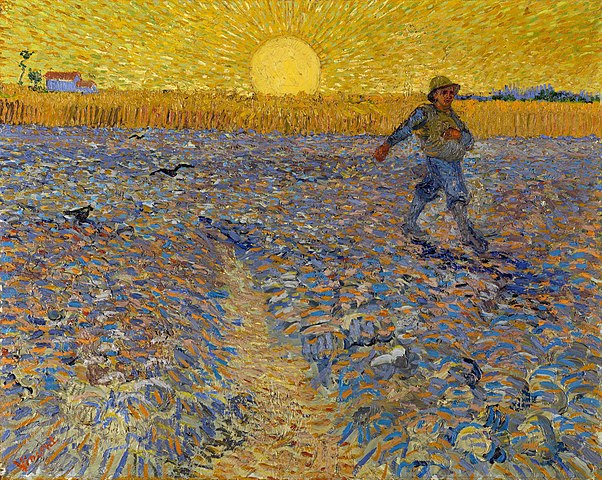The first big public address that Jesus gave in the Gospel of Matthew is called the Parable of the Sower. It was certainly a fine one to start with. His use of natural imagery was vivid and instantly understandable and it set the tone of the urgent need to reform that characterized all his teaching.
He spoke to them many things in parables, saying, “Behold, a farmer went out to sow. As he sowed, some seeds fell by the roadside, and the birds came and devoured them.
Others fell on rocky ground, where they didn’t have much soil, and immediately they sprang up, because they had no depth of earth.
When the sun had risen, they were scorched. Because they had no root, they withered away.
Others fell on good soil and yielded fruit: some one hundred times as much, some sixty, and some thirty. He who has ears to hear, let him hear.” [Matt. 13:3-9]
The disciples were stumped, and asked why he spoke in parables. Jesus’ answer was simply chilling:
He answered them, “To you it is given to know the mysteries of the Kingdom of Heaven, but it is not given to them.
For whoever has, to him will be given, and he will have abundance; but whoever doesn’t have, from him will be taken away even that which he has.
Therefore I speak to them in parables, because seeing they don’t see, and hearing, they don’t hear, neither do they understand. [Matt. 13: 11-13]
Leaving that aside, for the moment, we can be grateful that Jesus did leave his disciples in the dark. Instead, he explained it to them — and that explanation is one of the very few that made into Scripture. Therefore, it provides a place to test if simply substituting the symbolic meaning for the original term works.
Here is the explanation the Savior gave:
“Hear, then, the parable of the farmer. When anyone hears the word of the Kingdom and doesn’t understand it, the evil one comes and snatches away that which has been sown in his heart.
This is what was sown by the roadside. What was sown on the rocky places, this is he who hears the word and immediately with joy receives it; yet he has no root in himself, but endures for a while. When oppression or persecution arises because of the word, immediately he stumbles.
What was sown among the thorns, this is he who hears the word, but the cares of this age and the deceitfulness of riches choke the word, and he becomes unfruitful.
What was sown on the good ground, this is he who hears the word and understands it, who most certainly bears fruit and produces, some one hundred times as much, some sixty, and some thirty.” [Matt. 13:18-23]
So substituting Jesus’ definitions for the words in the parable, the meaning becomes clear However, he did not define everything. Some have been found in other sources: the Bible are in italics, while those [in brackets] are from the Early Church Fathers. Finally, the substitutions that still remained to be worked out are in (parentheses):
And he told them many things in parables, saying: “Listen! A [preacher of the Good News] went out to [preach].
And as he [preached], some words of the Kingdom fell on the those without understanding, and the Devil came and ate them up.
Other words of the Kingdom fell on those faithless in adversity, where they did not have much (capacity for belief), and they sprang up quickly, since they had no deep (capacity for belief). But when (fury) rose, they were scorched; and since they had no (commitment), they withered away.
Other words of the Kingdom fell among cares of the world and lure of wealth, and the cares of the world and lure of wealth grew up and choked them.
Other words of the Kingdom fell on hearers who understood and brought forth (faith), some [in perfection], some [with pride], some [with maturity].
[Let those who can understand hidden mysteries learn]!”
Looks pretty good, providing a clear translation that is understandable, and matches what Jesus said it should. Let’s try it on the only other parable Jesus explained, the Parable of the Weeds.

